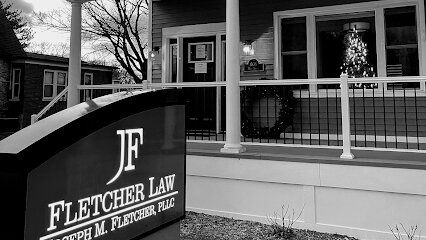Best Juvenile Law Lawyers in New York City
Share your needs with us, get contacted by law firms.
Free. Takes 2 min.
List of the best lawyers in New York City, United States
1. About Juvenile Law in New York City, United States
Juvenile law in New York City is primarily handled within the family court system. These matters typically involve minors and focus on safety, welfare, and rehabilitation rather than punishment. The Family Court handles delinquency, neglect, abuse, and youth guardianship issues, with a strong emphasis on keeping families together when possible.
In New York, the law has shifted toward treating younger offenders differently than adults, including reforms aimed at avoiding juvenile detention and prioritizing services and diversion. The system includes collaboration among family court judges, prosecutors, defense attorneys, social services, and education professionals to support minors and families.
ACS and other city agencies work to protect and support children and families in New York City, coordinating services across housing, education, and child welfare.Source: New York City Administration for Children's Services (ACS)
State agencies such as the Office of Children and Family Services oversee child welfare programs, foster care, and juvenile justice services across New York State.Source: New York State Office of Children and Family Services (OCFS)
2. Why You May Need a Lawyer
In New York City, a juvenile matters lawyer can guide you through complex court procedures and protect a minor’s rights. Below are real-world scenarios where legal counsel is essential.
- A teenager is accused of juvenile delinquency in a Manhattan police precinct and faces a court petition in Family Court. An attorney helps evaluate evidence, explore diversion options, and protect eligibility for services rather than adult penalties.
- A 15-year-old is alleged to be at risk of abuse or neglect in Brooklyn. A knowledgeable solicitor can petition for protective orders, arrange safe placement, and coordinate with social services for family reunification plans.
- A high school student in Queens faces truancy charges that could trigger school interventions and court involvement. A lawyer can negotiate proper school discipline alternatives and ensure education rights are preserved.
- A parent seeks guardianship or adoption for a foster child within NYC’s foster care system. An attorney can navigate the court process, consent requirements, and filing deadlines.
- A family is dealing with a dissolution or relocation issue involving a child’s best interests. A legal counsel helps prepare for hearings and presents evidence on welfare considerations and stability.
- A youth is charged with a criminal offense as a juvenile or under a youthful offender framework. An attorney assesses eligibility for youth protections, plea options, and potential sentence reductions in appropriate cases.
3. Local Laws Overview
New York City juvenile matters are governed by several key statutes. The following are two to three primary laws you should know, along with notable changes relevant to the city’s juvenile justice landscape.
- Family Court Act (FCA) - This act governs juvenile delinquency, status offenses, abuse and neglect, guardianship, and related family matters in New York State Family Court. The FCA sets procedures for petitions, hearings, confidentiality, and orders of protection. The Raise the Age reforms in 2018 shifted many juvenile criminal cases away from adult courts to Family Court, emphasizing rehabilitation and community-based services.
- Social Services Law (SSL) - This law covers child protective services, foster care, adoption, and family support services in New York. SSL provisions establish how cases of abuse and neglect are investigated and how permanency plans are pursued.
- Criminal Procedure Law (CPL) - This statute includes provisions related to juvenile defendants, including mechanisms for youth protections, rights, and possible sentencing considerations for younger offenders.
The following points provide context for recent trends and how they affect NYC families and youths. The Raise the Age reforms took effect in 2018, directing 16- and 17-year-olds charged with offenses to be processed in Family Court rather than adult criminal court. This shift reflects the city’s emphasis on rehabilitation and prevention rather than punishment for youth.
New York State agencies have increasingly prioritized alternatives to detention, expanded diversion programs, and coordinated services for families in crisis.Source: OCFS
4. Frequently Asked Questions
What is juvenile delinquency in New York City?
Juvenile delinquency refers to acts by a minor that would be crimes if committed by an adult. The Family Court handles most delinquency cases for individuals under 18, focusing on case outcomes that emphasize rehabilitation. This is different from a criminal case in adult court.
What is a PINS matter in New York City?
PINS stands for persons in need of supervision. These cases involve minors whose behavior or circumstances suggest dependence on protective services or guidance from the court. A family court attorney helps determine appropriate interventions and services.
How do I find a juvenile law attorney in NYC?
Start by contacting your local legal aid society or the court's intake office for a list of appointed attorneys. You can also seek a private attorney with experience in family court and juvenile law in New York City. Consider interviewing multiple attorneys to gauge familiarity with NYC agencies and procedures.
What is the typical cost of hiring a juvenile law attorney in NYC?
Costs vary widely. Public defender services may be available in some cases, while private attorneys bill hourly or on a flat-fee basis for specific services. Ask for an estimate and discuss payment options during the initial consultation.
How long do NYC juvenile cases take from intake to resolution?
Timeline varies by case type and court calendar. Delinquency or abuse and neglect cases can take several months to a year, depending on complexity, available services, and negotiations with the district attorney and the court.
Do I need a lawyer for a truancy hearing?
Having a lawyer can help ensure your child’s rights are protected, especially if a school-based referral could result in court involvement. A solicitor can negotiate school-based supports and minimize disruption to education.
What’s the difference between juvenile delinquency and status offense?
Juvenile delinquency involves acts that would be crimes if committed by an adult. A status offense is an activity that is unlawful only because the person is a minor, such as truancy or curfew violations. The handling differs by case type and court jurisdiction.
Can I appeal a family court decision affecting my child?
Yes, certain orders or determinations can be appealed or reviewed in higher courts. An attorney can explain appeal rights and assist with the required timelines and paperwork.
How do confidentiality and sealing of juvenile records work in NYC?
Juvenile records are generally confidential to protect a minor’s privacy. An attorney can advise on when records can be sealed or expunged and how that affects future opportunities, such as education or employment.
What is the role of a guardian ad litem in NYC juvenile cases?
A guardian ad litem advocates for the best interests of the child in court proceedings. They help the judge understand the child’s needs and circumstances when making decisions.
What kinds of services may a judge order in NYC juvenile cases?
Judges may order counseling, family therapy, educational support, probation, or placement in a supervised program. The goal is to address root causes and improve outcomes for the minor and family.
Is there a difference between a solicitor and an attorney in New York City?
In New York City, the term commonly used is attorney or lawyer. The title solicitor is more typical in some other jurisdictions and is not commonly used in New York’s juvenile system.
5. Additional Resources
These official organizations provide information about juvenile justice, child welfare, and related services in New York City and State.
- New York City Administration for Children's Services (ACS) - Handles foster care, adoption, child protective services, and family support within NYC. https://www1.nyc.gov/site/acs/index.page
- New York State Office of Children and Family Services (OCFS) - Oversees state-wide child welfare, juvenile justice programs, and family services. https://ocfs.ny.gov/
- New York State Unified Court System - Provides information on Family Court, juvenile delinquency, and court procedures. https://nycourts.gov/
6. Next Steps
- Identify the exact issue and the jurisdiction involved (Family Court, criminal court, or school disciplinary processes). This helps determine the proper legal path and necessary documents.
- Consult the NYC ACS or a local legal aid office to understand free or low-cost options for legal representation for youths and families.
- Schedule a consultation with a juvenile law attorney who regularly handles NYC Family Court matters and has experience with Raise the Age procedures.
- Prepare a checklist for the consultation including school records, medical records, prior court involvement, and any relevant correspondences with social services.
- Obtain copies of all court filings and secure any available school and mental health assessments to inform the case strategy.
- Discuss potential outcomes, including diversion, services, or placement, to align expectations with the judge’s goals for rehabilitation and safety.
- Confirm the attorney’s fees, expected timeline, and plan for ongoing updates throughout the case, including hearings and potential appeals.
Lawzana helps you find the best lawyers and law firms in New York City through a curated and pre-screened list of qualified legal professionals. Our platform offers rankings and detailed profiles of attorneys and law firms, allowing you to compare based on practice areas, including Juvenile Law, experience, and client feedback.
Each profile includes a description of the firm's areas of practice, client reviews, team members and partners, year of establishment, spoken languages, office locations, contact information, social media presence, and any published articles or resources. Most firms on our platform speak English and are experienced in both local and international legal matters.
Get a quote from top-rated law firms in New York City, United States — quickly, securely, and without unnecessary hassle.
Disclaimer:
The information provided on this page is for general informational purposes only and does not constitute legal advice. While we strive to ensure the accuracy and relevance of the content, legal information may change over time, and interpretations of the law can vary. You should always consult with a qualified legal professional for advice specific to your situation.
We disclaim all liability for actions taken or not taken based on the content of this page. If you believe any information is incorrect or outdated, please contact us, and we will review and update it where appropriate.
















